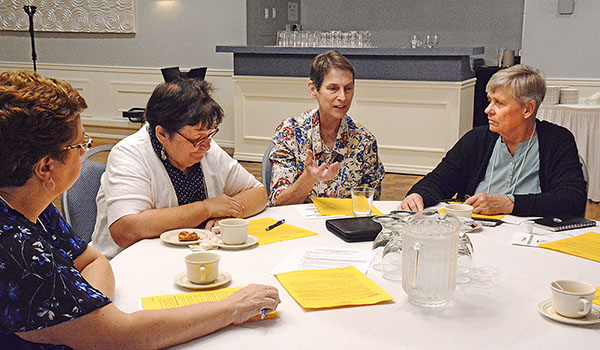Diocese to begin implementing new faith formation curriculum
by KIMBERLEE SABSHIN
In September, the Diocese of Buffalo began implementing a new faith formation curriculum, "Forming Disciples." To prepare parish leadership for this transition, diocesan staff from the Department of Lifelong Faith Formation have visited over 155 parishes to discuss it and answer questions. Parishes are being supported to develop their own implementation plans, likely to spread out over two to three years, rather than a few months.
"The bishop approved it last summer, in the summer of 2016, for implementation now in 2017," said Mary Beth Coates, director of Lifelong Faith Formation, who noted that diocesan staff have spent the last year making these visits and hosting in-services.
The official implementation date for "Forming Disciples" was Sept. 17, Catechetical Sunday. The intention was to introduce it and begin planning, and not implement all of it at once. The goal of parish visits was to stress that integrating the enhancements of the new material should be part of a comprehensive parish planning process.
The curriculum is what Coates called a "spiral" curriculum, as opposed to the "thematic" curriculum the diocese has been using since 2000. Thematic curriculum focused on teaching a different aspect or theme of the Catholic faith to students in each grade level. In the spiral curriculum, all these themes will appear in each grade level, taught in age-appropriate ways, going deeper into it each year.
"That part of it was really important and valuable to us, that we have a really strong and up-to-date content piece," Coates said. "The content can't stand alone. We have to be more intentional about our delivery system. How we're delivering the content of the faith is almost as important as the content itself. If we are not interpreting it through the lens of the culture or in ways that our families can understand, then it is not helpful to anyone."
The framework for the curriculum is centered around a four-component model, which may challenge the conventional notion that religious education is a one-size-fits-all model, or that all parishes must offer the same thing.
"The four components require each parish to attend to family engagement and at-home attention, a connection to the parish and the community life of the parish, some service component that includes theological reflection (not just the act of volunteer work), and to be cautious and thoughtful about how to use technology as an aide in learning," Coates said.
If parishes are attentive to each of these components through a long-term implementation process, the goal is to make a person's experience in religious education integrated into his or her individual family life. "This, in turn, will promote not just knowledge of the faith, but practice of the faith and lifelong discipleship," Coates explained.
The content of the curriculum, which Coates described as "rigorous," comes from a document that the Diocese of Buffalo licensed from the Archdiocese of Washington, D.C., one that took three years to adapt to the needs of the Diocese of Buffalo. The framework is intended to be customizable to the unique needs of every parish, which vary.
"The diocese isn't telling parish leaders that you must do Monday night religious education, or 'must must must,' but rather, you must take these four components and look at all the resources you have at your parish and seek effective ways to integrate these components into faith formation. Every parish is different," she said.
"Even parishes that are near each other geographically are very different. There's a different culture, there are different resources and different people. It's not realistic to think that every parish can do faith formation in the same way. 'Forming Disciples' is our diocesan roadmap to assist parishes to plan and strengthen our catechetical mission."
For more information about "Forming Disciples," contact the diocesan Lifelong Faith Formation office at 716-847-5501.




